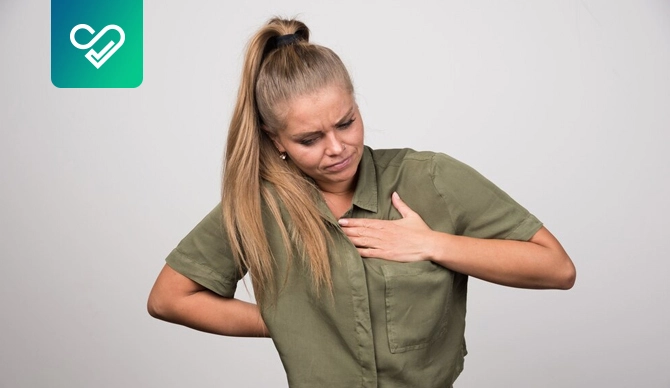Have you ever felt your heart pounding so hard it feels like coming out of your chest? Or experienced moments when it races uncontrollably, leaving you breathless and anxious?
These sensations can be alarming, prompting a range of questions: Is this normal? When should I be concerned? And more!
In today’s blog, we will explore the complexities of rapid heart rate, understanding its various forms, rapid heart rate causes, accompanying symptoms, and most importantly, When to go to the hospital for rapid heart rate.
Table of contents
What is a Dangerous Heart Rate?
Your heart rate, measured in beats per minute (BPM), can vary based on factors such as age, fitness level, and overall health. While a resting heart rate typically falls between 60 to 100 BPM, deviations from this range may signal a potential issue. A heart rate exceeding 100 BPM at rest, known as tachycardia, can be considered dangerous, especially if sustained or accompanied by troubling symptoms.
Types of Rapid Heart Rate
- Sinus Tachycardia: Occurs when the heart’s natural pacemaker, the sinoatrial (SA) node, sends electrical signals at an accelerated rate.
- Atrial Fibrillation (AFib): Characterized by erratic electrical impulses in the atria, leading to rapid, irregular heartbeats.
- Supraventricular Tachycardia (SVT): Arises from abnormal electrical pathways above the heart’s ventricles, causing sudden bouts of rapid heart rate.
- Ventricular Tachycardia (VT): Originates in the heart’s lower chambers (ventricles), potentially impairing its ability to pump blood effectively.
What Causes Heart Palpitations?
Heart palpitations, often synonymous with rapid heart rate, can stem from various triggers, including:
- Stress and Anxiety: Heightened emotions can stimulate the sympathetic nervous system, accelerating heart rate.
- Caffeine and Stimulants: Excessive intake of caffeine or stimulant medications can rev up heart activity.
- Medical Conditions: Underlying issues like thyroid disorders, electrolyte imbalances, or heart diseases may precipitate palpitations.
- Medications: Certain drugs, such as decongestants or asthma medications, may induce rapid heart rate as a side effect.
Symptoms of Rapid Heart Rate
Recognizing the signs of rapid heart rate is crucial for prompt intervention. Common symptoms include:
- Palpitations: Sensations of rapid, pounding, or irregular heartbeats.
- Shortness of Breath: Difficulty breathing, often accompanied by a feeling of suffocation.
- Dizziness or Lightheadedness: A sensation of faintness or unsteadiness.
- Chest Discomfort: Pressure, tightness, or pain in the chest region.
- Fatigue: Excessive tiredness or weakness, even with minimal exertion.
Does your heart rate increase when sick?
Yes, an elevated heart rate when sick is experienced when the body mobilizes its defense mechanisms to combat infection or inflammation. Fever, dehydration, and metabolic disturbances associated with sickness can all contribute to a temporary increase in heart rate. However, persistent or severe elevation warrants medical evaluation to rule out underlying complications.
When to Go to the Hospital for Rapid Heart Rate?
While occasional episodes of rapid heart rate may be benign, certain red flags necessitate immediate medical attention:
- Severe Symptoms: If rapid heart rate is accompanied by chest pain, fainting, or difficulty breathing, seek emergency care without delay.
- Prolonged Episodes: Persistent tachycardia lasting more than a few minutes, especially if unresponsive to home remedies like relaxation techniques or deep breathing exercises, warrants urgent evaluation.
- Underlying Health Conditions: Individuals with pre-existing heart conditions, such as coronary artery disease or heart failure, should be particularly vigilant and heed any deviations from their baseline heart rate.
- History of Syncope: Patients with a history of fainting spells or syncope should not ignore rapid heart rate, as it may precede a potentially life-threatening arrhythmia.
Frequently Asked Questions
Is the heart rate higher when sick?
Yes, illness can lead to an elevated heart rate due to factors like fever, dehydration, and metabolic changes associated with the body’s immune response.
Does your heart rate go up when you are sick?
Generally, yes. Illness triggers physiological responses that can increase heart rate as the body fights off infection or inflammation.
Does pain increase heart rate?
Yes, pain stimulates the sympathetic nervous system, leading to an increase in heart rate as part of the body’s stress response.
What heart rate is an emergency?
Any sustained heart rate exceeding 100 beats per minute (BPM) at rest, especially if accompanied by severe symptoms like chest pain, fainting, or difficulty breathing, warrants urgent medical attention.
– Disclaimer –
This blog is for informational & educational purposes only and does not intend to substitute any professional medical advice or consultation. For any health-related concerns, please consult with your physician, or call 911.
Read More Related Articles:
- Heartbeat Dilemma: Is It AFib or Panic Attack?
- Foods To Avoid If You Have Heart Palpitations
- Interrupted Sleep: Coping With Heart Palpitations At Night

